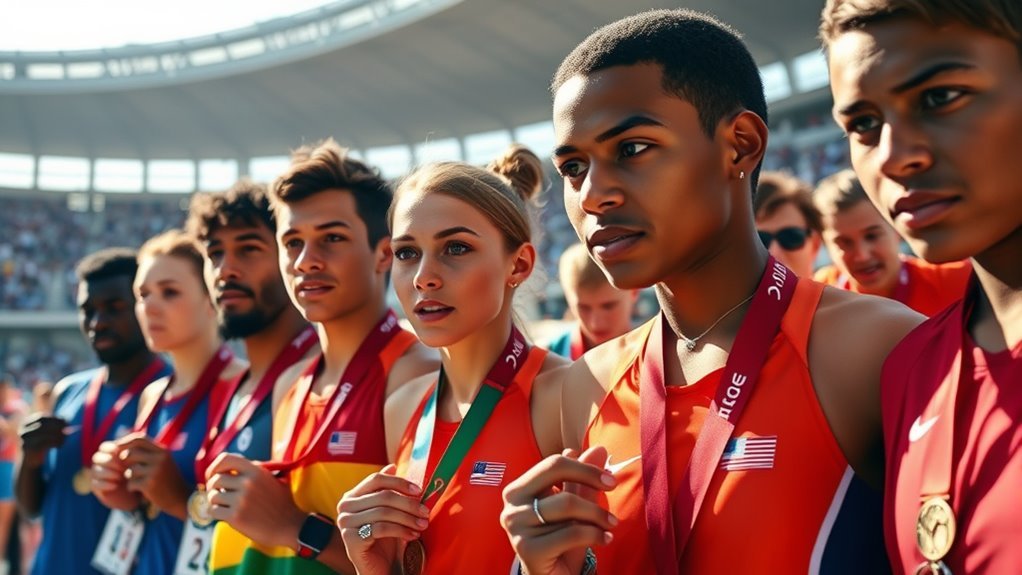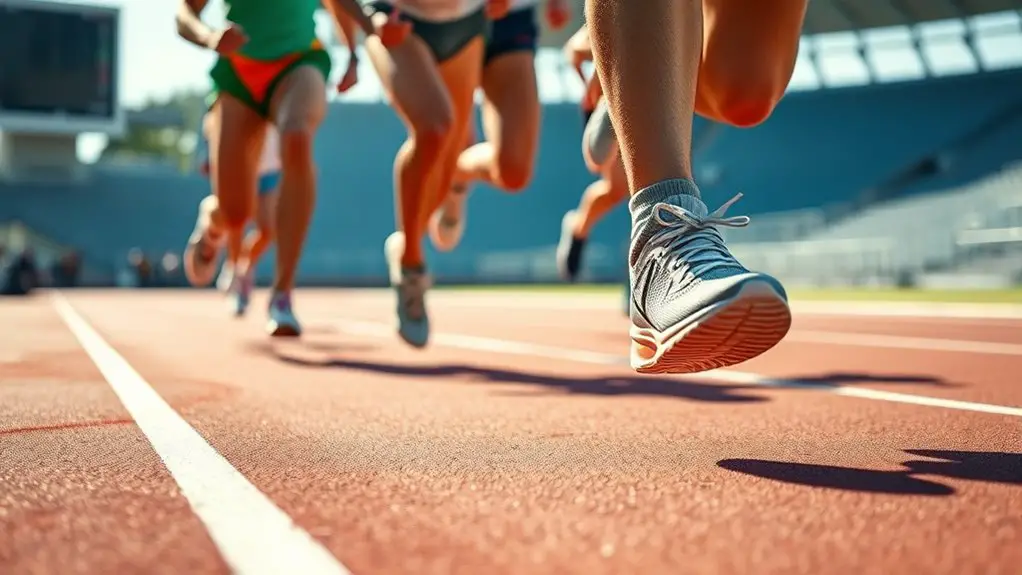Most Olympic athletes don’t receive substantial salaries for their participation. They rely heavily on sponsorship deals, government funding, and personal sacrifices to cover training and travel costs. Many juggle part-time jobs to pursue their dreams, which can make finances quite challenging. This financial burden could also impact their performance. If you’re curious about the specific financial obstacles they face and how it affects their training, there’s much more to uncover on this topic.
Overview of Olympic Athlete Compensation
While many people assume that Olympic athletes receive substantial salaries for their participation, the reality is quite different. Most athletes rely heavily on Olympic funding and minimal athlete stipends, which often aren’t enough to cover their training and living expenses. You might be surprised to learn that some athletes juggle multiple jobs just to pursue their dreams. The funding they do receive can vary greatly based on their sport, country, and performance. This financial uncertainty can be a heavy burden, but it often fuels their passion and determination. Many athletes embrace this challenge, aiming for greatness despite the limitations. Ultimately, the love for their sport and the desire for freedom keeps them pushing forward, even when the financial support falls short.
Sponsorship Deals and Endorsements
Although Olympic athletes often face financial challenges, many find relief through sponsorship deals and endorsements. These opportunities not only provide essential income but also enable athletes to focus on their training without the stress of financial burdens. Here are some effective sponsorship strategies athletes often consider:
Olympic athletes alleviate financial stress through sponsorships, allowing them to concentrate on training and performance.
- Personal Branding: Athletes build unique identities that resonate with brands.
- Social Media Presence: Engaging content on platforms attracts potential sponsors.
- Partnerships with Local Businesses: Collaborating with regional brands can yield mutual benefits.
- Networking at Events: Connecting with industry insiders at competitions can lead to deals.
- Long-Term Relationships: Establishing ongoing partnerships fosters trust and stability.
Additionally, athletes can enhance their appeal to sponsors by demonstrating mental toughness in their performance and overcoming challenges, which showcases resilience and determination.
Government Funding and Support
Government funding and support play an essential role in helping athletes pursue their Olympic dreams, as many rely on these resources to cover training expenses, travel costs, and equipment. Without this important backing, you might struggle to reach your full potential. The way funding allocation works can greatly impact your journey, with some sports receiving more government support than others. This disparity can create challenges for athletes in lesser-known disciplines. It’s critical for you to understand how these funding mechanisms operate, as they can shape your opportunities and experiences. Advocating for fair and balanced government support can lead to a more level playing field, allowing every athlete the freedom to chase their Olympic aspirations without the heavy burden of financial constraints.
Financial Challenges Faced by Athletes
Even with government funding, many athletes face significant financial challenges on their path to the Olympics. The struggle often revolves around the costs associated with pursuing their passion. Here are some key hurdles you might encounter:
- Training expenses: Equipment, facilities, and coaching can add up quickly.
- Travel costs: Competing often means traveling, which isn’t always covered.
- Living expenses: Balancing training with part-time work can be tough.
- Health care: Injuries can lead to costly medical bills, impacting your career longevity.
- Sponsorship issues: Securing reliable sponsorships can be challenging, leaving athletes financially vulnerable.
Additionally, staying hydrated is crucial for athletes, as hydration supports optimal performance and helps prevent fatigue and cramps. These factors can weigh heavily on athletes, making financial stability a constant battle as they aim for Olympic glory.
Impact of Financial Factors on Performance
Financial pressures can greatly impact an athlete’s performance, as the stress of managing expenses often distracts from training and competition. When financial stress mounts, it can lead to performance anxiety, making it tough to focus on the goal. Understanding the root causes of performance anxiety can help athletes better manage their mindset under pressure.
Here’s how financial factors can influence an athlete’s mindset:
| Stress Type | Effect on Training | Potential Outcome |
|---|---|---|
| Financial Stress | Decreased focus | Poor performance |
| Performance Anxiety | Reduced confidence | Increased mistakes |
| Healthy Finances | Enhanced motivation | Improved results |
Frequently Asked Questions
Are Olympic Athletes Allowed to Work During Their Training?
Absolutely, you can work while training for the Olympics! Think of it as juggling two balls at once. Many athletes manage their training schedules alongside part-time jobs or pursue sponsorship opportunities that help fund their dreams. Balancing work and training isn’t easy, but it can offer financial freedom and valuable experience. Just be sure to prioritize your training; after all, that’s what’ll lead you to the podium!
Do Athletes Pay Taxes on Their Olympic Earnings?
Yes, athletes do have tax implications on their Olympic earnings. Depending on where you live and compete, earnings regulations can vary considerably. If you’re earning money from sponsorships or medals, you’ll likely need to report that income. It’s vital to understand your tax obligations to guarantee you’re compliant. That said, many athletes seek professional advice to navigate these complexities, allowing them to focus on what they love—competing and achieving their dreams.
How Do Athletes Qualify for Financial Support?
Athletes qualify for financial support through various avenues. They often seek sponsorship opportunities from brands that align with their values and sports. Additionally, many athletes apply for government grants designed to assist them in training and competition expenses. It’s essential you understand that securing this funding requires dedication and a solid performance record, which ultimately can grant you the freedom to focus on your athletic goals without financial stress.
Can Athletes Receive Scholarships for Olympic Training?
Yes, athletes can receive scholarships for Olympic training. Many universities and organizations offer scholarship opportunities specifically designed to help cover training expenses. If you’re passionate about your sport and committed to pursuing an Olympic dream, seeking these scholarships can greatly lighten your financial burden. It’s all about finding the right programs that align with your goals and help you achieve the freedom to train and compete without worrying about costs.
Are There Financial Benefits for Medal Winners?
Yes, there are financial benefits for medal winners. You could receive a medal prize from your country, which often varies in amount. Additionally, if you win, you might attract lucrative sponsorship deals that can greatly boost your income. These opportunities not only reward your hard work but also provide a chance to gain financial freedom and continue pursuing your passion without the constraints of everyday financial worries.




